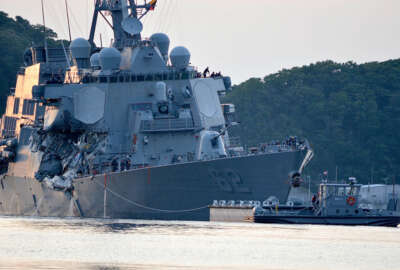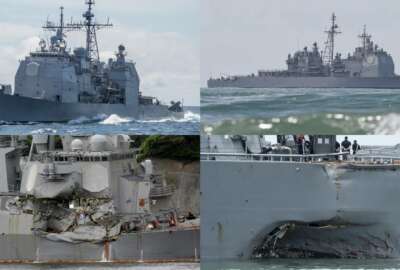
Navy goes through holistic existential examination after ship collisions
The Navy is looking at more than just its ships after deadly collisions this summer.
The Navy is focusing on more than just ships in its strategic review of the naval collisions this summer that put the service’s maintenance issues on full display.
Navy Secretary Richard Spencer said the Navy’s Strategic Readiness review will encompass a whole host of service- and military-wide issues that might improve the ship problem.
The review task force has been given “a blank charge and as they go through their analysis alongside Adm. [Phil] Davidson’s tactical analysis, I have told them look at anything,” Spencer said Sept. 20 during a roundtable with reporters at the Pentagon.
Spencer said anything and everything is on the table and that includes some of the most entrenched military structures. The Defense Officer Personnel Management Act is one of the areas on which Spencer wants to focus.
That act put into effect the military’s up or out system, which forces service members to promote to the next rank in a certain amount of time or be separated from the military.
“If, in fact, we have excellent people in excellent positions, why shouldn’t we find a way to keep that gray matter, that institutional knowledge, that high performing person facing off against that issue and not be penalized that he or she is lost in his class on promotion?” Spencer said.
Letting sailors stay in a particular rank could let them keep doing what they actually love instead of forcing them into a leadership position. In some cases, pilots who want to only fly or sailors who like certain positions on a ship are forced to take on more responsibility as leaders instead of doing the task they joined the Navy to do.
Spencer also offered that in areas like cyber or medicine that the Navy might need a revolving door.
“Maybe people are allowed to go back into their community for a year or two years to get completely refreshed in their community and come back in again without being penalized,” Spencer said.
He noted that Senate Armed Services Committee Chairman John McCain asked the Navy to bring up any issues with which Congress could help the Navy.
The Navy enlisted a handful of corporations to help with the review. BP North America, Crowley Marine and Boeing are working on the review. Sandia Labs also has a hand in the strategy.
BP “went through the Deepwater Horizon, a cathartic event for them. [As a result] they basically restructured their culture of safety. I didn’t want their safety plan. I wanted the people who actually went through the voyage on how they got there because we are going to go through a voyage on how to reattach ourselves to a safety culture,” Spencer said.
The Navy also spoke to the Mayo Clinic.
Latest Navy News
“Mayo Clinic had done some seminal studies in long-lasting, high-pressure team environments. What I mean by that is a lung transplant or a kidney transplant, a seven-hour operation where you have teams of professionals in the room. They thought they could get better results if they deconstructed it and started from zero and as an example you have the surgeon, which is basically the captain of the operation and then you had professional comports which were anesthesiologists, pulmonary technicians, the nurses, etc.,” Spencer said. “There’s now a way to structure the teamwork through [Mayo’s] analysis where any one of them can raise their hand and go ‘need a correction change,’ ‘need a pause,’ whatever the case may be.”
That helps fight fatigue and cut back on mistakes. It’s also a tremendous change from the “yes, sir” culture in the military, where mission comes over personal feelings.
But when it comes to safety, the “yes, sir” attitude is beginning to cause problems. The Navy is taking notice of sailors who are working 100 hour workweeks and trying to figure out just what is going into those hours.
Spencer said the Navy has to set a maximum number of hours people can work.
“I have asked [the Government Accountability Office] what is in the 100 hours, because I’ve heard bathing is in it, eating is in it. Someone does not have a rust pick in their hand for 100 hours during the week. I just want to make sure we are all on the same taxonomy about the 100 hours, but that being said yes, we owe it to them. What’s the difference between someone on a bridge or someone in the engine room or someone doing any one of their jobs any different than a pilot flying a plane? I don’t see any difference at all,” Spencer said.
The strategic review is supposed to come out 30 days after Davidson’s comprehensive review of surface fleet operations and incidents comes out at the end of October.
Former Chief of Naval Operations Adm. Gary Roughead and Chairman of the Defense Business Board Michael Bayer are heading up the strategic review.
Copyright © 2024 Federal News Network. All rights reserved. This website is not intended for users located within the European Economic Area.
Scott Maucione is a defense reporter for Federal News Network and reports on human capital, workforce and the Defense Department at-large.
Follow @smaucioneWFED
Related Stories





